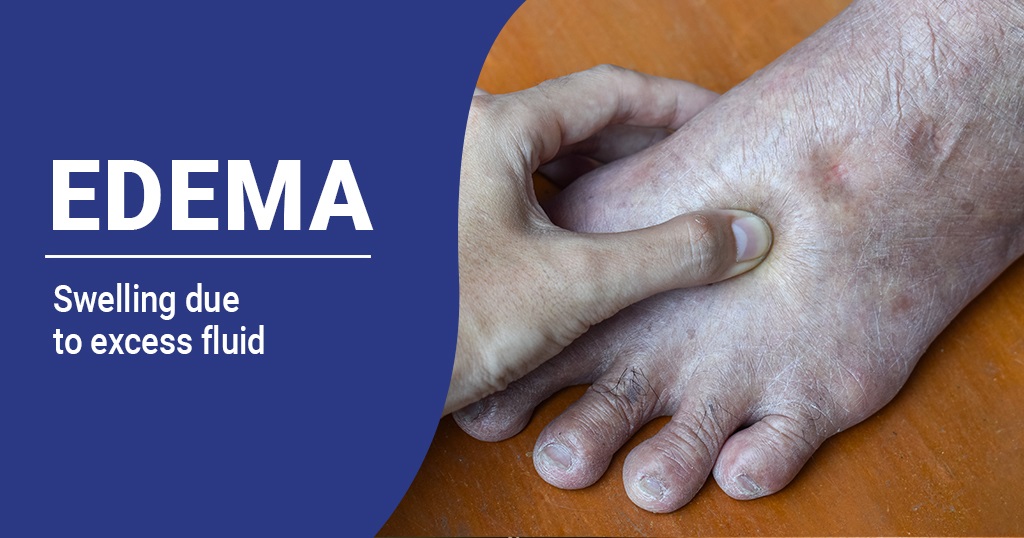- 18-Jul-23
Edema is a medical term used to describe swelling caused by the accumulation of excess fluid in the body's tissues. It occurs when there is an imbalance between the movement of fluid out of the blood vessels and the removal of fluid back into the circulatory system or lymphatic system. This fluid buildup results in the expansion of the affected tissues leading to visible swelling and a feeling of tightness or heaviness in the affected area. Edema can occur in various parts of the body such as the legs, ankles, feet, hands, face, or abdomen.
Edema Meaning In Urdu:
مطلب ہے کہ کسی جسمانی حصے میں پانی کا جمع ہونا جو مواد کے دباؤ یا مسلسل جذب کی ناکامی کی بنا پر ہوتا ہے۔ یہ عموماً انداموں جیسے پاؤں، ٹخنوں، ٹانگوں یا ہاتھوں میں ہوتا ہے، لیکن دوسرے جسمانی حصوں کو بھی متاثر کرسکتا ہے۔ Edema کی وجہ سے جسمانی حصوں میں سوجن ہوجاتی ہے اور یہ عموماً جلد کی سطح پر ظاہر ہوتی ہے۔
Edema Causes:
Edema can have various causes including:
- Increased fluid retention: Edema can occur when the body retains more fluid than usual. This can happen due to factors such as heart failure, kidney disease, liver disease, or hormonal imbalances.
- Inflammation: Inflammatory conditions like arthritis, cellulitis, or vasculitis can lead to localized edema in the affected area.
- Injury or trauma: Swelling can occur as a result of an injury such as a sprained ankle or a bruise. The body responds to the injury by increasing blood flow and causing fluid to accumulate in the affected area.
- Venous insufficiency: When the veins in the legs have difficulty returning blood back to the heart, fluid can leak into the surrounding tissues leading to edema. This condition is often seen in individuals with varicose veins or deep vein thrombosis (DVT).
- Lymphatic system disorders: The lymphatic system is responsible for draining excess fluid from tissues. If the lymphatic system is impaired due to conditions like lymphedema or lymphatic obstruction, fluid can accumulate and cause edema.
- Medications: Certain medications, such as calcium channel blockers, nonsteroidal anti-inflammatory drugs (NSAIDs) or corticosteroids, can cause fluid retention and edema as a side effect.
- Prolonged sitting or standing: Remaining in one position for an extended period especially sitting or standing can lead to fluid accumulation in the lower limbs.
It's important to note that these are just some common causes of edema and a thorough evaluation by a healthcare professional is necessary to determine the underlying cause in each specific case.
Edema Symptoms:
Symptoms of edema can vary depending on the underlying cause and the location of the swelling. However, some common symptoms of edema include:
- Swelling: The primary symptom of edema is swelling in the affected area. This can occur in the legs, ankles, feet, hands or other body parts. The swelling may be mild or severe and it may be accompanied by a feeling of tightness or heaviness.
- Puffiness: The swollen area may appear puffy or stretched and the skin may feel tight and shiny.
- Weight gain: If edema is caused by fluid retention, it can lead to a noticeable increase in body weight.
- Skin changes: The skin over the swollen area may become stretched, shiny or discolored. In some cases, it may be difficult to move or press on the swollen area.
- Reduced flexibility: Edema can cause stiffness or reduced flexibility in the affected area due to the swelling and increased fluid accumulation.
It's important to note that edema can sometimes be a symptom of an underlying medical condition that requires prompt medical attention. If you experience persistent or worsening swelling, it is recommended to consult a healthcare professional for a proper diagnosis and appropriate treatment.
When To See A Doctor?
If you have been experiencing edema that persists for several days or weeks or if the swelling is increasing in size or affecting additional body parts, it is recommended to seek medical attention. This is important to determine the underlying cause of the edema and to receive appropriate treatment to address any potential health issues.
Integrated Medical Care Hospital (IMC Hospital):
IMC Hospital is a well-known and frequently mentioned premier hospital in Pakistan. Now that they are all together under one roof, the IMC Hospital may benefit from the senior, knowledgeable, and experienced medical specialists' years of expertise working at some of the most renowned and recognized medical facilities in the world. Contact the Integrated Medical Care Hospital (IMC Hospital) to make an appointment.

 Map
Map










